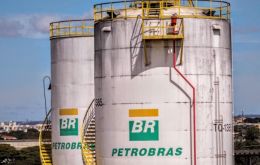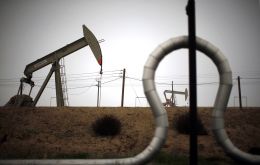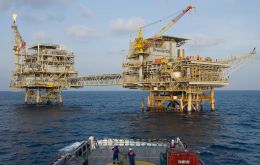MercoPress. South Atlantic News Agency
Tag: oil price
-
Saturday, December 1st 2018 - 09:24 UTC
Oil prices in November slide 20%, the weakest month in more than ten years

Oil prices edged lower on Friday due to concerns of oversupply and a strong dollar. The two benchmarks, North Sea Brent LCOc1 and U.S. crude CLc1, still have had their weakest month in more than 10 years in November, losing more than 20% as global supply has outstripped demand.
-
Tuesday, November 27th 2018 - 15:18 UTC
Sharp fall in Brazil's Petrobras fuel but not so fast at pumps

The average price of gasoline at Petrobras' refineries has dropped around 20% in November as of Tuesday but that decrease will not hit retail prices anytime soon. The state-run petroleum company made the announcement Monday, but gas stations were reluctant to follow suit, at least not at the same level.
-
Tuesday, November 27th 2018 - 09:00 UTC
Brazil Eyes US$ 30 Billion Offshore Oil Boom

Over the past few years, Brazil has held several very successful oil auctions under production-sharing contracts in its pre-salt layer, attracting major oil companies to its prized offshore oil area.
-
Saturday, November 24th 2018 - 08:59 UTC
Oil price slumps 8% to lowest in more than a year: Crude supply grows faster than demand

Oil prices slumped up to nearly 8% to the lowest in more than a year on Friday, posting the seventh consecutive weekly loss, amid intensifying fears of a supply glut even as major producers consider cutting output. Oil supply, led by U.S. producers, is growing faster than demand and to prevent a build-up of unused fuel such as the one that emerged in 2015, the Organization of the Petroleum Exporting Countries is expected to start trimming output after a meeting on Dec. 6.
-
Wednesday, November 21st 2018 - 08:17 UTC
Khashoggi syndrome: Crude prices at their lowest since 2017; fears of further market volatility

Crude prices hit their lowest level since 2017 on Tuesday, sliding further into a bear market after President Donald Trump signaled the US would not punish Saudi Arabia, the world’s largest oil exporter, over the killing of Washington Post journalist Jamal Khashoggi in its Istanbul consulate.
-
Saturday, November 17th 2018 - 08:56 UTC
Premier Oil confident in reducing debt; begins drilling in Mexico

Premier Oil said it expected full-year production to come in at the low end of a previously announced 80,000 to 85,000 barrels per day range. The company, with interests in the Falkland Islands and which has been focusing on cutting debts, also said its debt pile would shrink to US$ 2.4 billion by the year-end.
-
Friday, November 9th 2018 - 08:27 UTC
Oil down 20% from its October peak despite US sanctions on Iran

Oil markets on Friday remained weak as rising supply and concerns of an economic slowdown pressured prices, with U.S. crude now down by 20% since early October. U.S. West Texas Intermediate (WTI) crude oil futures were at US$ 61.63 per barrel.
-
Wednesday, October 10th 2018 - 17:04 UTC
Oil Price Rally Boosts Electric Car Sales

Tesla's competition is about to get more crowded next year with many legacy automakers and luxury brands launching a record number of battery electric vehicles and plug-in hybrids.
-
Thursday, September 27th 2018 - 08:24 UTC
Iran tells Trump he is responsible for oil price increase: stop interfering in the Middle East

President Donald Trump should stop interfering in the Middle East if he wants the price of oil to stop rising, Iranian Oil Minister Bijan Zanganeh was quoted as saying on Wednesday.
-
Tuesday, September 25th 2018 - 07:45 UTC
Oil market turbulence ahead of US sanctions on Iran; OPEC meeting does not plan to increase output

Brent crude breached US$ 81 a barrel on Monday — its highest level in nearly four years — on the back of a tightening oil market and OPEC leaders signaling they won't be immediately boosting output. Global benchmark Brent crude rose as high as US$ 81.39 a barrel, its strongest level since Nov. 21, 2014.
